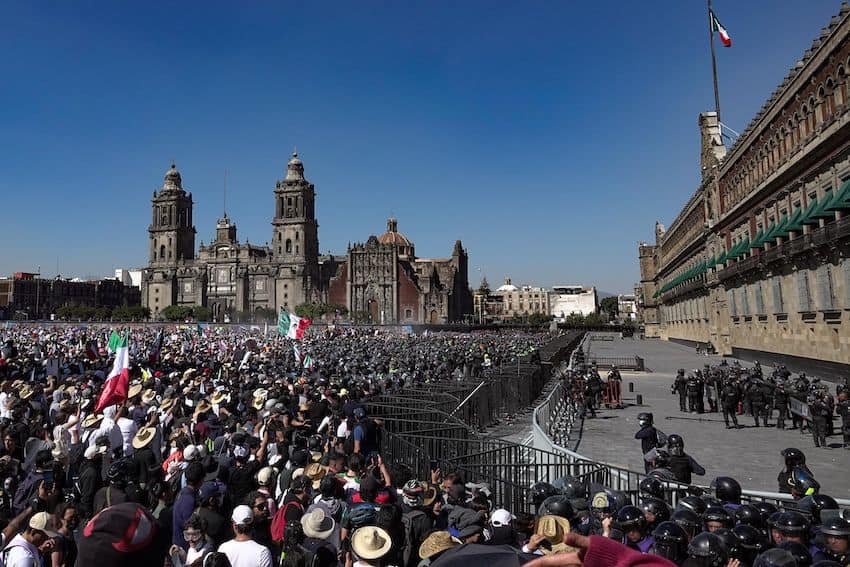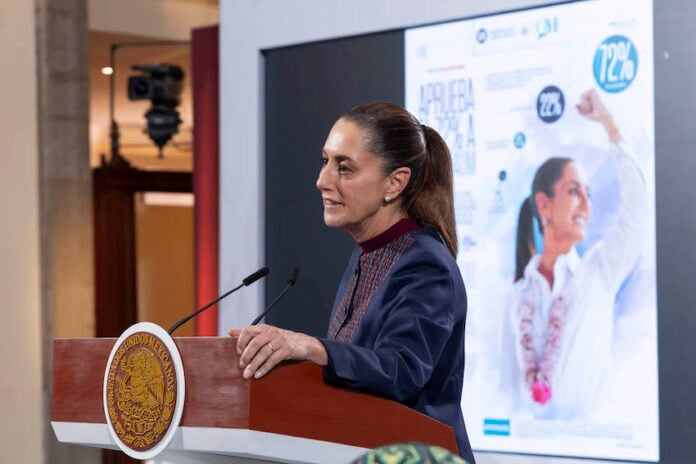At her Tuesday morning press conference, President Claudia Sheinbaum responded to U.S. President Donald Trump’s latest threats of intervention in Mexico, as well as new travel advice for Mexico that was issued by the Canadian government.
Among other issues, Sheinbaum spoke about the people who remain in custody after being detained in Mexico City’s central square on Saturday for allegedly attacking police at the end of a large anti-government protest march.
Here is a recap of the president’s Nov. 18 mañanera.
Sheinbaum says — once again — that US intervention in Mexico ‘won’t happen’
Asked about Trump’s comment on Monday that launching “strikes in Mexico to stop drugs” would be “OK” with him, Sheinbaum once again declared that a U.S. military intervention in Mexico “won’t happen.”
“… I’ve said it many times,” the president noted.
Mexican President Claudia Sheinbaum ruled out US military intervention against criminal groups, saying Mexico will operate in its own territory https://t.co/bUt1C3ZWHb pic.twitter.com/1ilRY8e9zg
— Reuters (@Reuters) November 18, 2025
“In the conversations I’ve had with President Trump, over the phone, he has … said: ‘We offer you a United States military intervention in Mexico — whatever you need to combat criminal groups.’ But I have told him every time that we can collaborate, that they can help us with any information they have, but that we operate within our own territory, and we do not accept intervention from any foreign government,” Sheinbaum said.
“I’ve told him this over the phone, and we’ve also said it to the State Department, to Marco Rubio. And they’ve understood; in fact, the agreement we have with them is one of collaboration and coordination,” she said.
Sheinbaum stressed that “respect for sovereignty” and “respect for territorial integrity” are among “the first points” of a “joint statement on security cooperation” issued in early September.
She also said that the U.S. government has acknowledged in a statement that it won’t intervene in Mexico unless her administration requests such assistance.
“And we’re not going to ask for it because we don’t want interventions from any foreign government,” Sheinbaum said.
“There is collaboration and there is coordination, but there is not subordination, nor can we allow an intervention. … The last time the United States came to Mexico with an intervention, they took half the territory. So, it’s not that we don’t want support, we do. But not with foreign troops, that’s something else,” she said.
Sheinbaum says that Revolution Day military parade will go ahead in CDMX, despite new ‘Gen Z’ march
Sheinbaum said that the annual Revolution Day military parade will take place in Mexico City this Thursday, even though a new “Generation Z” protest march is planned for the same day in the capital.
The first “Gen Z” march in the capital last Saturday turned violent, with some protesters attacking police officers in the Zócalo, Mexico City’s main square.
Sheinbaum declared that the Revolution Day parade “will take place on Nov. 20, as it always does.”
“… We have to have respect for what the Mexican Army represents,” she said.

When a reporter suggested that there could be a clash between protesters and military personnel participating in the parade, the president dismissed such a possibility, before modifying her language and saying, “we don’t think” anything will happen.
According to a post on Sunday by the Generación Z México account on the X social media site, a protest march from the Angel of Independence Monument to the Zócalo will take place for the second time in less than a week this Thursday, starting at 11 a.m.
The same account promoted the anti-government marches against insecurity that took place last Saturday in Mexico City and other cities across the country.
Most of the participants were not members of Generation Z — people born between 1997 and 2012 — and before the protest took place, Sheinbaum accused opposition parties of infiltrating the Gen Z movement.
The president denounced the violence in the Zócalo that marred Saturday’s protest in Mexico City and left 100 police officers and 20 other people with injuries.
According to a post on Tuesday by the Generación Z México account, a protest will also be held at the National Autonomous University of Mexico (UNAM) in Mexico City at 9 a.m. Thursday.
“We invite you to participate in our protest at UNAM,” reads a digital flyer. “For our people, for Generation Z.”
Sheinbaum: ‘There has to be evidence for any accusation’
A reporter noted that there is a lot of “commotion” on social media about protesters who were arrested at the end of the demonstration in Mexico City last Saturday. At least three of those people face charges of attempted murder, while 15 others face other charges, including assault of police officers.
Asked about those in custody, Sheinbaum said “there has to be evidence for any accusation” against them.
“The Mexico City Attorney General’s Office is handling the cases, and obviously, for any investigation file that is opened, there has to be evidence of the accusations,” she said.
“Yesterday we saw very disturbing images,” Sheinbaum said, referring to photos and video footage she presented of acts of violence being committed against police officers.
“The Attorney General’s Office has to show that the people who are detained really participated in an illegal act,” she added.
Sheinbaum responds to Canada’s new Mexico travel advice
A reporter noted that the Canadian government has issued updated travel advice for Mexico, advising Canadian citizens to “avoid non-essential travel” to 14 states, with certain exceptions in each state.
Those states are Chiapas, Chihuahua, Colima, Guanajuato, Guerrero, Jalisco, Morelos, Michoacán, Nayarit, Nuevo León, Sinaloa, Sonora, Tamaulipas and Zacatecas.
Asked whether her government was aware of the new travel advice, Sheinbaum first noted that “a lot” of Canadian tourists come to Mexico. Tourism Minister Josefina Rodríguez promptly noted that Canadian tourist numbers are up 11% this year.
Sheinbaum said that her government would ask the Canadian Embassy in Mexico about the Canadian government’s new travel advice, which warns against travel to some of Mexico’s most violent states.
The president subsequently declared that official advisories against travel to certain parts of Mexico are not very effective, “because Americans, Canadians [and] Europeans continue arriving to the southeast, to the center, to the entire country.”
International tourist numbers increased 6.4% annually in the first nine months of the year to reach 34.7 million. The total number of “international visitors” — including cruise ship passengers and day trippers from the countries that border Mexico — increased 13.9% to reach 71 million between January and September.
Mexico’s top source country for tourists is the United States, which advises U.S. citizens not to travel to six Mexican states (Colima, Guerrero, Michoacán, Sinaloa, Tamaulipas and Guerrero) and to “reconsider travel” to seven others.
By Mexico News Daily chief staff writer Peter Davies (peter.davies@mexiconewsdaily.com)
